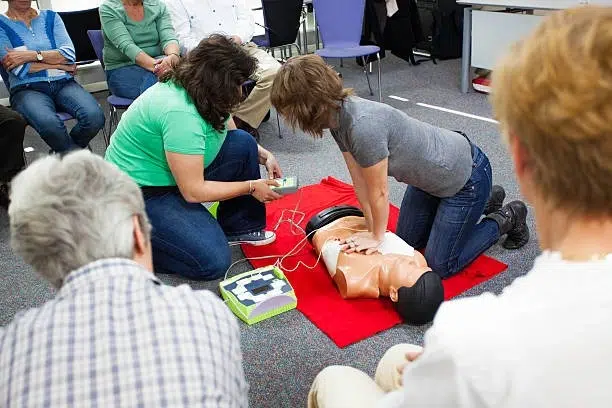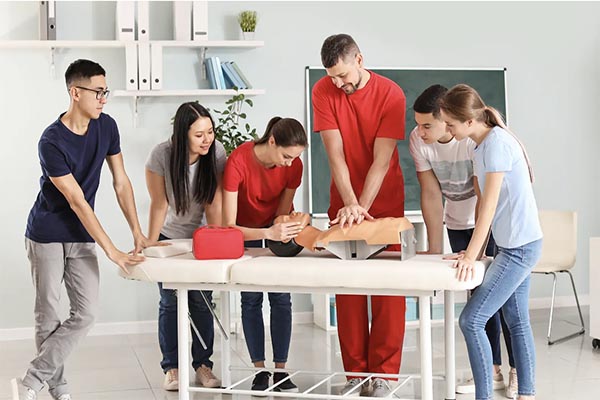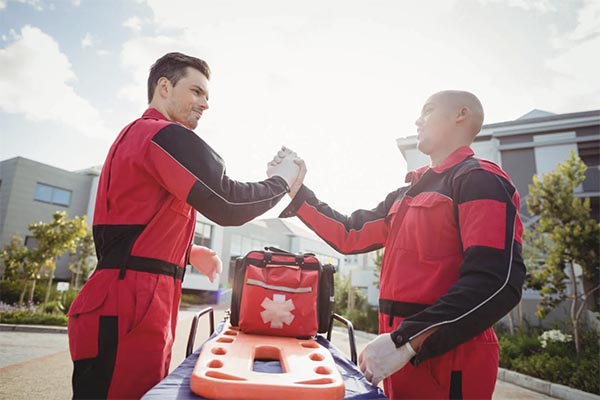
In the fast-paced world of healthcare, emergencies can arise at any moment. Whether you work in a hospital, clinic, or private practice, being prepared to handle cardiac emergencies is crucial. That’s where CPR (Cardiopulmonary Resuscitation) training comes in. CPR training equips healthcare professionals with the skills needed to save lives during cardiac arrest situations. In this article, we will discuss why every healthcare professional needs CPR training and how it enhances patient safety.
Cardiac arrest occurs when the heart suddenly stops beating. This can happen due to various reasons, including heart attacks, severe arrhythmias, or trauma. When cardiac arrest occurs, blood flow to the brain and other vital organs stops, leading to unconsciousness and, if not treated immediately, death.

CPR is a lifesaving technique that helps maintain blood flow and oxygenation to the brain and other vital organs until advanced medical care can be provided. It involves chest compressions and rescue breaths to manually pump blood and deliver oxygen to the body. Effective CPR can double or even triple a person’s chance of survival.
Healthcare professionals are often the first responders in medical emergencies. Whether it’s in a hospital setting or a community clinic, having the ability to perform CPR can make a significant difference in the outcome of a cardiac arrest situation. CPR training ensures that healthcare professionals can respond quickly and effectively, giving patients the best chance of survival.
Patient safety is a top priority in healthcare. By being trained in CPR, healthcare professionals can provide immediate care during cardiac emergencies, reducing the time it takes to start life-saving interventions. This quick response can prevent brain damage and increase the likelihood of a positive outcome.
Many healthcare facilities and organizations require their staff to be CPR certified. This is because CPR training is a standard component of Basic Life Support (BLS) training, which is essential for healthcare professionals. By obtaining CPR certification, healthcare workers comply with industry standards and ensure they are equipped with the necessary skills to handle emergencies.
Knowing how to perform CPR can boost a healthcare professional’s confidence in handling emergencies. Confidence is crucial when dealing with high-pressure situations, and CPR training provides the knowledge and practice needed to perform the technique effectively.
In a healthcare setting, emergencies often require a coordinated effort from multiple team members. CPR training emphasizes the importance of teamwork and teaches healthcare professionals how to work together seamlessly during a cardiac arrest situation. This teamwork can significantly improve patient outcomes.
CPR training provides lifelong skills that can be used both in professional and personal settings. Healthcare professionals can use their CPR knowledge to assist in emergencies outside of work, such as in community settings or at home. This makes CPR training valuable not only for patient care but also for overall community safety.

BLS training is a comprehensive course that covers CPR, the use of automated external defibrillators (AEDs), and other basic life-saving techniques. It is specifically designed for healthcare professionals and provides in-depth training on how to handle cardiac emergencies. BLS certification is often a requirement for healthcare workers.
ACLS training builds on the principles of BLS and provides advanced techniques for managing cardiac emergencies. It includes the use of advanced airway management, pharmacology, and ECG interpretation. ACLS certification is typically required for healthcare professionals working in critical care settings.
PALS training focuses on the specific needs of pediatric patients during cardiac emergencies. It covers CPR techniques for infants and children, as well as advanced interventions for pediatric patients. PALS certification is essential for healthcare professionals working in pediatrics or emergency care.
CPR training is an essential skill for every healthcare professional. It prepares them to respond effectively to cardiac emergencies, enhances patient safety, and complies with industry standards. By obtaining CPR certification, healthcare professionals build confidence, improve teamwork, and acquire lifelong skills that benefit both their professional and personal lives. Investing in CPR training is a crucial step in ensuring the highest level of care and safety for patients.
If you haven’t already, consider enrolling in a CPR training course today and take the first step towards becoming a more skilled and confident healthcare professional.
Don’t wait until an emergency happens to realize the importance of CPR training. By obtaining your CPR certification, you can be confident in your ability to save a life when it counts the most. At CPR Classes Near Me, we offer high-quality, industry-standard CPR courses tailored to healthcare professionals’ needs. Our certified instructors provide both in-person and online training options to fit your schedule, ensuring you receive the best education and hands-on experience possible.
Equip yourself with the skills and knowledge to save lives. Visit CPR Classes Near Me and register for a CPR certification course today. Take the first step towards becoming a more skilled, confident, and prepared healthcare professional.
Our primary goal is to ensure that you receive a top-quality CPR/First Aid certification. With our in-person training in Austin, you can learn CPR and BLS in just one class. Your presence is all that’s needed to continue with your lesson! During your session, you will complete all the live-training components necessary to ensure you receive your AHA Healthcare Provider certification card.
Our CPR Classes in Austin are discounted to $59.95 (saving you $20), and our CPR + First Aid Class is offered at $79.95 (also saving you $20). When looking for CPR Classes, ensure to check for the American Heart Association seal. Other sites might seem cheaper but frequently lack the official training credentials demanded by employers.
Upon successful completion of the course, you will obtain a CPR certification that is valid for two years. The AHA CPR certification is recognized with the highest acceptance rate among employers nationwide.
Indeed! Enroll in any CPR Certification Austin BLS course to extend your certification for an additional two years. The in-person BLS course and the Renewal Class are identical.
Anyone capable of completing the course independently should consider pursuing CPR training and CPR Certification. There is no minimum age restriction for obtaining a CPR certification in Austin through the American Heart Association (AHA)..
CPR training needs to be carried out in person to guarantee its effectiveness. Our experienced instructors offer an engaging and dynamic learning experience. Typically, employers do not recognize CPR certifications that are obtained solely through online courses.
All authorized American Heart Association training centers are obligated to display the entire video. After a three-hour session with CPR Classes Near Me Austin, your BLS CPR eCard will be promptly issued by the instructor on the same day!